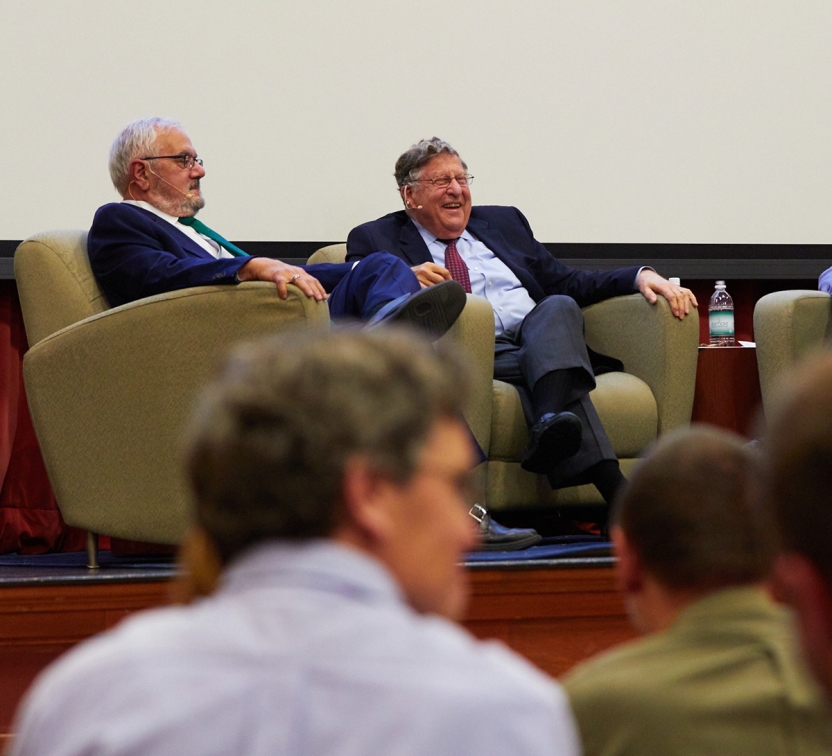Frank and Sununu Discuss Economic Opportunity in Trump Era

MIDDLEBURY, Vt. – In a season of political turmoil, common ground can feel like an elusive—if not impossible—goal. And yet the search for shared opinions and respectful debate was what brought together seasoned policy makers and political thinkers on Oct. 11 at Middlebury College in a conversation titled “Finding Common Ground for Economic Opportunity in the Trump Era.”
The discussion paired former Congressman Barney Frank (D-MA) and John Sununu, the former Republican governor of New Hampshire. Gail Russell Chaddock, a former political editor at the Christian Science Monitor, moderated the debate.
The afternoon conversation was an attempt not only to discuss economic opportunity, but also to model civility in debate. The event marked the eighth public forum hosted by the Common Ground Committee, and the first held on a college campus. The group’s mission is “bringing light not heat to public discourse;” the committee has no partisan political agenda and prides itself on financial independence.
That the campus in question was Middlebury’s bore no small amount of significance: Middlebury College became the subject of national headlines and vigorous debate after student protestors disrupted a planned lecture by Dr. Charles Murray, a controversial political scientist and resident scholar at the American Enterprise Institute.
“I think it’s fair to say that this is a time in our nation’s political history when folks don’t listen to each other as much as they used to, especially points of view with which they may not agree,” said former Governor of Vermont and Middlebury College Executive in Residence Jim Douglas ’72 as he introduced the event. Douglas acknowledged that the College has been at the epicenter of controversy about speech on campus following the Murray incident, which like the Common Ground discussion took place in Wilson Hall.
“I’m confident that today and on future occasions we’ll have a very productive discussion about issues that are very important to our country and our future,” said Douglas.
“It has been a tumultuous political season, but we’re here tonight because we think there is a possibility to still work together and get things done,” said the moderator, Chaddock, in her opening remarks. “There is clearly listening to be done, and bridges to be mended or built, and that’s our purpose here.”
Early on, the immediate common ground came in the form of consensus that agreement is, in fact, sometimes overrated.
“Making deals is a good thing, but it only works if people start from principled positions,” said Frank.
“Civil discourse and civil disagreement is essential in a democracy,” said Sununu. The political process wasn’t designed to be easy, he went on, and what we know call “gridlock” used to simply be known as checks and balances.
Moving on to the subject at hand — economic opportunity — Frank and Sununu honed in on different priorities. Repeatedly Frank expressed the need to pair free trade with support for those individuals — often the marginalized and least educated — who routinely lose out despite overall economic gain for the country.
“We should continue the process of global integration but take steps to help those people who are not going to do well because of that,” said Frank, calling for a reasonable minimum wage, tax policies designed to help the marginalized, and significant expenditures on infrastructure.
Sununu said that, in his mind, the country’s biggest problem revolves around capital investment. “I really do feel that we have seen almost a decade of American corporations choosing not to invest, to husband their tax, to store their money, to put a great deal of that money offshore. … There has to be an incentive for repatriating that capital,” said Sununu.
The conversation was at times lighthearted; Sununu and Frank had the rapport of colleagues who had shared the stage, and dug into political debate, several times before. Their discussion ranged from the question of money in politics (if citizens get involved, “votes will kick money’s ass,” said Frank) to the Deferred Action for Childhood Arrivals, or DACA.
They also spoke about the “two parallel universes” that many Americans live in, and the difficulty of finding resolutions when the art of compromising is itself vilified. Getting their news from entirely different sources, and living in silos of reinforcing opinions, means Americans rarely encounter ideas counter to their own beliefs. The result? They believe that their opinions are held by the majority, and resent when politicians make deals with the other side.
“It is one thing when people disagree because they think you’ve made an error,” said Frank. “It’s another when they think you have betrayed them.”
The challenge, Sununu said later on, was to push back — “to really not accept this trend in America that finds it objectionable to have multiple viewpoints intermingled, and discussed, and discoursed.”
As the conversation wrapped up, Chaddock posed one final question for Sununu and Frank: “How can these students be most effective in bringing about change in government?”
Again, the two speakers found common ground: Get involved, they said.
“It is our system, and it works when we help make it work,” said Sununu.
“I know the protests and demonstrations — if they help you mobilize, OK,” said Frank. But, he cautioned, those demonstrations have to lead to political action to be effective. “If you care deeply about a cause, and you’re engaged in an activity on its behalf that makes you feel warm and supported and part of a group of people with whom you are in total solidarity, you’re probably not advancing that cause very much,” he said. “You’re cheering each other on, and you’re not reaching out.”
Reporting by Kathryn Flagg; Photos by Todd Balfour

